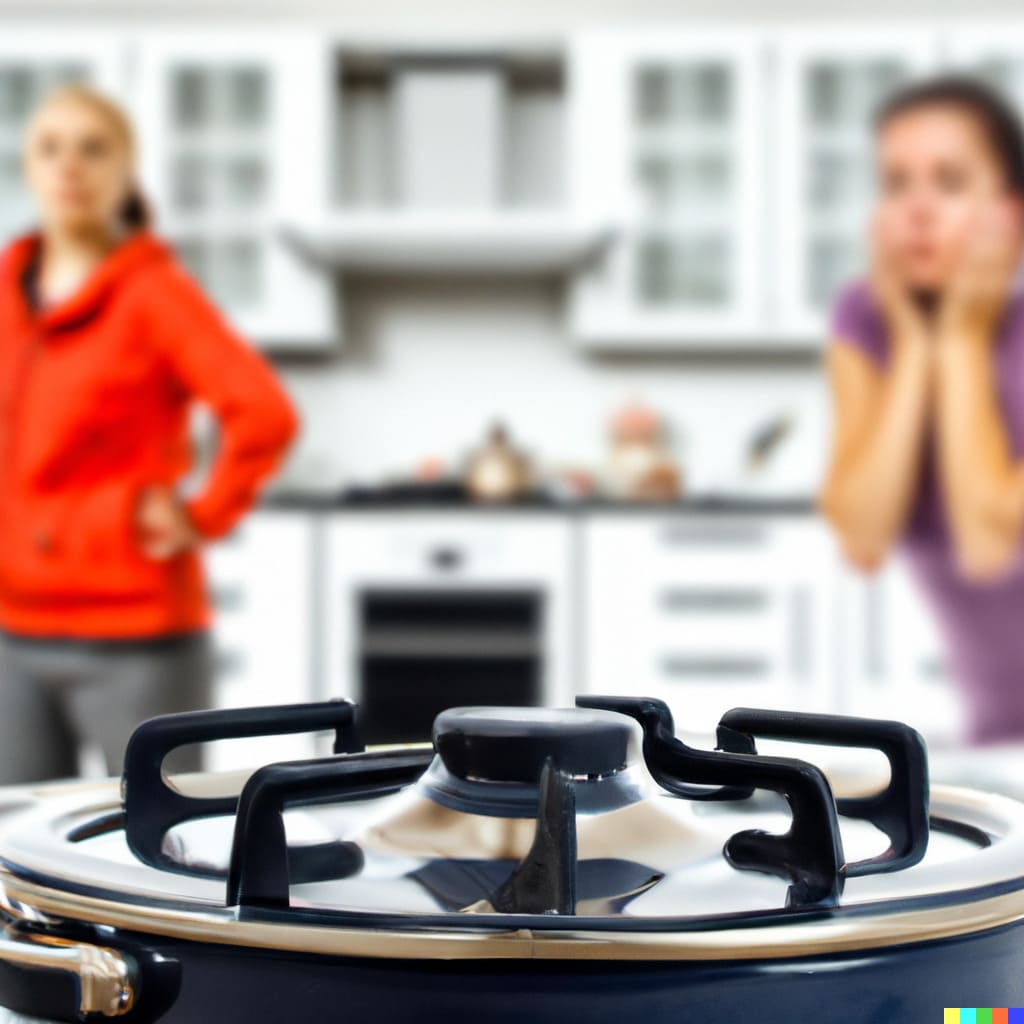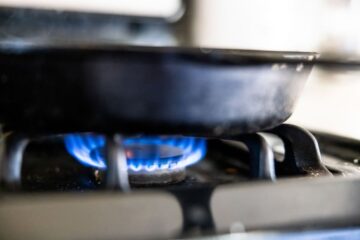Determining whether your stove is electric or gas can be necessary for various reasons, such as knowing how to properly operate and maintain it or understanding its energy source. Critical indicators can help determine if your stove is electric or gas.
Some of these include the type of fuel it uses, the presence of a gas line or electrical outlet, and the overall design and layout of the stove. This helpful guide will explore different ways on how to tell if your stove is electric or gas, so you can better understand your appliance and how to use it properly.
How Does A Gas Oven Work?
A gas oven uses gas as a fuel source to heat the oven. The gas is supplied to the oven through a gas line and is ignited by an electric spark from a spark ignition system or a pilot light. The heat from the burning gas is used to heat the oven. A thermostat controls the temperature inside the oven by regulating the gas flow to the burners. The oven also has a fan that circulates the hot air to ensure the temperature is even throughout the oven.
How Does An Oven Work Electric?
An electric oven uses heating elements, typically made of metal, to generate heat. These elements are located at the top and bottom of the oven and can be controlled separately. The heat is then circulated throughout the oven by a fan or convection system, allowing for a more even cooking temperature. The thermostat monitors the temperature inside the oven and adjusts the heating elements as necessary to maintain the desired temperature. The oven’s control panel allows the user to set the temperature and cooking time and select the appropriate heating mode (bake, broil, etc.).
How To Tell If Your Stove Is Electric Or Gas?
You can tell if your stove is electric or gas by looking at the source of heat for the burners. If the burners are heated by electricity, the stove is electric. If the burners are heated by gas, the stove is gas.
You can also check the stove’s power source. If it is plugged into an electrical outlet, it is electric, and if it is connected to a gas line, it is a gas stove. Finally, you can check the control panel. If it has an electric ignition, it is an electric stove, and if it has knobs for gas, it is a gas stove.
How Do I Know If My Oven Is Convection?
There are a few ways to determine if your oven is a convection oven:
-
Check the owner’s manual
The manual should indicate whether the oven is a convection oven.
-
Look for a convection setting on the oven control panel
Many convection ovens have a setting that allows you to switch between traditional and convection cooking.
-
Look for a fan in the oven
Convection ovens have a fan and a heating element that circulates hot air throughout the oven, which is not present in traditional ovens.
-
Check the oven dimensions
Convection ovens tend to be slightly larger and more profound than traditional ovens.
How To Tell If Gas Oven Is On?
You can tell if a gas oven is on by looking for a flame inside the oven or by checking the oven’s control knob or digital display to see if it is set to a cooking temperature. The gas oven is on if the flame is lit and the oven is set to a cooking temperature.
How Do I Know If My Wall Oven Is Gas Or Electric?
To determine if your wall oven is gas or electric, you must look at the connection behind the oven. If a gas line comes into the back of the oven, it is a gas oven. If there is an electrical cord and outlet, it is an electric oven.
You can check the control panel on the front of the oven, as gas ovens typically have knobs for adjusting the temperature and settings. In contrast, electric ovens may have a digital display and touch controls. If unsure, you can consult the user manual or contact the manufacturer for clarification.
How To Know If You Have A Gas Stove?
There are a few ways to determine if you have a gas stove:
-
Check for a gas line connection
Look for a gas line connection behind the stove. If you see a flexible metal hose connected to a valve, it is likely a gas stove.
-
Look for an ignition source
Gas stoves have an ignition source, such as a button or a knob, used to light the burners. On the other hand, electric stoves do not have an ignition source and are typically powered by an electric cord.
-
Check the burners
Gas stove burners typically have a blue flame when they are on. In contrast, electric stove burners are typically red or orange.
- Look at the stove’s manual or check the model number.
Advantages And Disadvantages Of Electric Stoves Vs Gas Stoves
Advantages of Electric Stoves:
-
More precise temperature control
Electric stoves allow for more precise temperature control, making it easier to cook at specific temperatures.
-
Safety
These stoves do not produce open flames, making them less likely to cause fires.
-
Easy to clean
Electric stoves have smooth, flat surfaces that are easy to clean and maintain.
Disadvantages of Electric Stoves:
-
Power outages
Electric stoves will not work in the event of a power outage, making them less reliable during emergencies.
-
Higher energy costs
Electric stoves typically have higher energy costs than gas stoves.
-
Longer cooking times
Electric stoves may take longer to heat up and cook food than gas stoves.
Advantages of Gas Stoves:
-
Faster cooking times:
Gas stoves heat up and cook food faster than electric stoves.
-
Reliability during power outages:
Gas stoves can still be used during power outages, making them more reliable in emergencies.
-
Lower energy costs:
Gas stoves typically have lower energy costs than electric stoves.
Disadvantages of Gas Stoves:
-
Safety
Gas stoves have open flames, making them more likely to cause fires.
-
Difficult to clean
These stoves have burners and grates that can be difficult to clean and maintain.
-
Less precise temperature control
Gas stoves do not offer the same precise temperature control as electric stoves.
What Are The Differences Between Gas And Electric Ovens?
Gas ovens use gas as a fuel source to heat the oven, while electric ovens use electricity. Gas ovens generally heat up faster and have better temperature control, but they can be less energy efficient.
Electric ovens are generally more energy efficient but may take longer to heat up and have less precise temperature control. Gas ovens may have a slightly different flavor when cooking compared to electric ovens.
When Is It Time To Replace Your Stove?
It may be time to replace your stove if it shows signs of wear and tear, such as a malfunctioning burner or an unreliable ignition system. Other signs that a stove may need to be replaced include a worn-out or discolored surface, a broken or cracked cooktop, or an oven that is no longer heating correctly.
If your stove is more than 10-15 years old, consider upgrading to take advantage of newer, more energy-efficient models. Ultimately, it is up to the homeowner to decide when to replace their stove. Still, if you are experiencing any issues with your current stove, consider a replacement.
What Are The Factors To Consider When Choosing The Right Stove For You?
Type of Fuel:
The first factor to consider when choosing the right stove for you is the type of fuel it uses. Several fuel types are available for stoves, including wood, propane, natural gas, and electricity. Each fuel type has its advantages and disadvantages, so it’s essential to consider which will be the most convenient and cost-effective for your needs.
Size and Capacity:
Another essential factor to consider is the size and capacity of the stove. If you have a large family or plan on cooking for many people, you’ll need a stove with a larger cooking surface and more burners. On the other hand, a miniature stove will be more than enough if you’re living alone or have a small family.
Cooking Style:
The cooking style is also an essential factor to consider when choosing the right stove. If you’re a professional chef or a serious home cook, you’ll likely need a stove with a high-end range of features such as a griddle, a wok burner, or a grill. However, if you’re a casual cook, you may not need these features and can opt for a more direct stove.
Energy Efficiency:
Energy efficiency is another crucial factor to consider when choosing a stove. Look for stoves that are Energy Star certified or have high-efficiency ratings to help reduce your energy consumption and save money on your utility bills.
Safety Features:
Safety features are a must when choosing a stove. Look for stoves with automatic shut-off, child locks, and heat-proof handles to ensure your kitchen stays safe and accident-free.
Price:
Price is also an essential factor to consider when choosing a stove. While high-end models can be expensive, they often offer more features and better performance. However, many excellent stoves are also available at more affordable prices, so it’s essential to find a balance between price and features.
Brand and Warranty:
Lastly, it’s essential to consider the stove’s brand and warranty when deciding. Choose a reputable brand and look for a warranty that covers at least one year of parts and labor. This will give you peace of mind knowing that you’re covered if anything goes wrong with your stove.
- Do Electric Stoves Use Gas? (Clearing Up Confusion)
- Left The Gas Stove On Without A Flame? (A Guide)
Do You Need An Induction Stove?
An induction stove is a type of stove that uses induction heating to heat the cookware. It can be more efficient and precise than other types of stoves. Still, it requires cookware compatible with induction heating, such as cast iron or stainless steel. Whether or not you need an induction stove depends on your cooking needs and preferences. Suppose you’re looking for a more efficient and precise cooking option and are willing to invest in compatible cookware. In that case, an induction stove may be a good choice for you.
Overall Thoughts
In conclusion, determining whether your stove is electric or gas can be quickly done by checking the power source and observing the burners. If the stove is plugged into an electrical outlet, it is electric. If the burners are lit by a spark or match and have a gas smell, it is gas. Knowing your stove type is essential for selecting the right cookware, cleaning methods, and troubleshooting issues. Always refer to the manufacturer’s manual or consult a professional if unsure.



